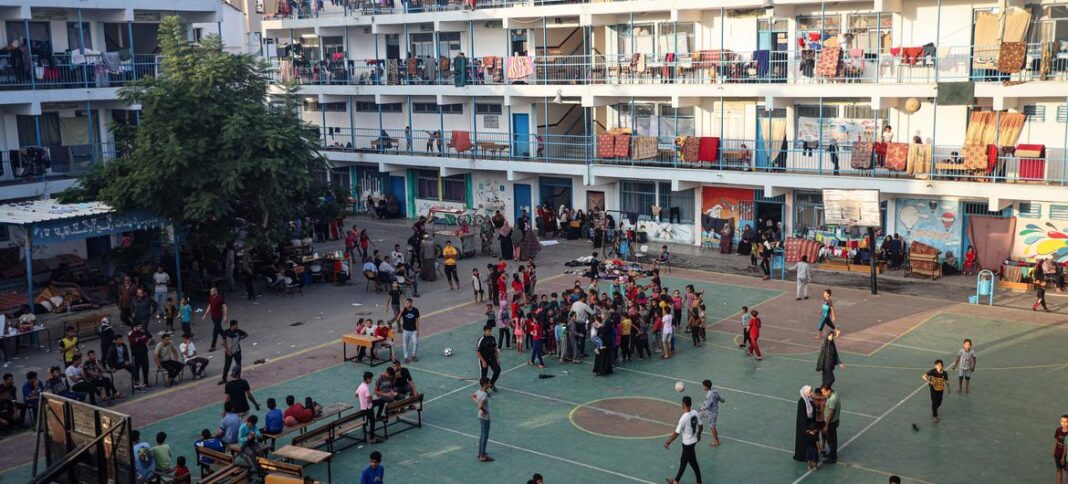As UNRWA’s Warehousing and Distribution Officer, Maha Hijazi was responsible for securing food for hundreds of thousands of displaced people who have sought refuge in its shelters.
Mission impossible
“UNRWA teams in Gaza are working hard to provide all the basic needs for those people, and number one is security and safety,” she said.
“We are doing our best despite all the challenges, despite the limited resources, despite that there is no fuel. But we are on the ground doing an impossible mission to secure what we can secure for our people.”
Ms. Hijazi is also a mother and this week her family fled to Egypt because her children will be safe there.
She spoke to UN News about the painful decision to leave Gaza, her home and her job.
This interview has been edited for length and clarity.
Maha Hijazi: Neither my kids nor any of our Palestinian kids feel safe, feel secure, and feel protected. The whole night and day they hear bombing everywhere and they have only one question: What did we do wrong to deserve this life, and are we going to die today or tonight?
Every day they would ask me before we went to bed, ‘Mama, will we die tonight, similar to our neighbours, similar to our relatives?’ So I had to hug them and promise them that if we die, we will die together, so we won’t feel anything. And if you hear the bombing, then you are safe. The rocket that will kill you, you will not hear its sound.
UN News: You fled Gaza on Monday for Egypt. Tell us about the journey, especially as humanitarians have said that nowhere is safe in Gaza.
Maha Hijazi: I feel angry that I have to leave my homeland – to leave my home, my apartment, and also to leave my daily work supporting the refugees – but what else could I do for my children because they have dual nationality. I need to get this chance for them to sleep and to feel that they are similar to other kids. So, I don’t want to miss this opportunity despite all the pain inside.
I can tell you that the whole trip I was crying with my kids because we don’t want to leave our land, we don’t want to leave Gaza. But we were forced to do that seeking safety and protection.
I actually lived in the middle of Gaza, in Deir al Balah, and the crossing is at Rafah in the south. Many people who were just evacuated were walking on Salahadin Street and they would have no place to go. We saw them and we witnessed the bombing during our trip until we reached the Rafah crossing which, by the way, not all Palestinian people are allowed to go through. You have to have another nationality or another passport. So, it was tough, and I will not forget this day.
UN News: What was your main task at UNRWA?
Maha Hijazi: My main task during the emergency, or during this war, was food focal point at the central operation room. So, I was responsible for securing the food items needed for the displaced people (IDPs) inside UNRWA shelters. Our plan was to have 150,000 Palestinians IDPs inside UNRWA shelters which are now reaching about one million. Their needs are very high and there is a lack of resources, so that’s why we’re working hard just to secure at least the minimum for them to survive.
UN News: How is UNRWA functioning, and where is it able to help Gazans?
Maha Hijazi: People are seeking UNRWA schools. They are seeking protection under the UN flag, and then we are responsible to provide them food and also non-food items, blankets, mattresses, in addition to drinking water and running water.
UNRWA teams in Gaza are working hard to provide all the basic needs for those people, and number one is security and safety. Despite that, there is no safe place in Gaza, which is very true and very correct. But we are doing our best, despite all the challenges, despite the limited resources, despite that there is no fuel. But we are on the ground doing an impossible mission to secure what we can secure for our people.
UN News: Was UNRWA getting fuel when you were there? How about food and water? Are you getting the supplies you need?
Maha Hijazi: For the first days of escalation, we stopped receiving fuel. And after that we received like drops of fuel just to operate our vehicles. Recently, maybe four or five days ago, we were allowed to receive fuel, but it was a very minor quantity. I recall the last days that I was in Gaza we had the aid trucks at the Rafah crossing, but no fuel on the trucks, so the trucks were stuck for two days waiting to be refueled. The generators to provide electricity, also pumping water, sewage plants, everything needs fuel, in addition to the bakeries.
With regard to food and water, it’s very, very minor quantities and not sufficient for our needs as the number of IDPs is dramatically increasing. But it’s not just people inside UNRWA shelters. There are hundreds of thousands of people outside UNRWA shelters. They are hungry and they don’t get food, even in local markets. My family was not in an UNRWA shelter, but I remember that my parents did not get sufficient quantities of food from the market. We witnessed that. We went to the markets, but they are empty. We found nothing to purchase. We have money, but we have nothing to purchase.









